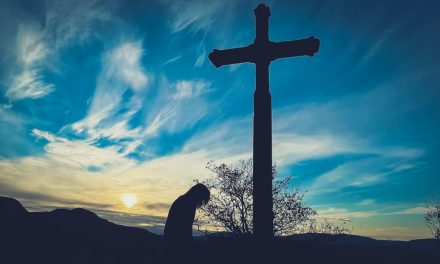
This week’s poem in the Catholic Poetry Room is by Cynthia Erlandson.
Foundations of the Cross
I. The First Generation: Abraham Takes Up His Loss
“And he went out, not knowing where he went.” — Hebrews 11: 8
“For hope that is seen is not hope.” –Romans 8:24
It was not by human power that Sarah, bent
With barren decades, took the pilgrimage;
She only had her husband’s cryptic word
That God had spoken, and that they were sent
(Her womb still void) to build a heritage
For non-existent heirs — how absurd
It sounded. Nor was it by sight he led
Her there; he’d been given no visible token
But the faraway stars. Not knowing where he went,
He slept below the light of those stars’ unnumbered
Host, and dreamed about the singular nation
To which his wife would give birth one day. Encumbered
With faith – his heaviest load – in expectation
He gave a tithe, and was promised that his offspring
Would be slaves (a debatable blessing –
Dust of the earth, to be walked on,
Despised by Ishmael’s pagan elder nation,
Until the covenanted generation
Which he would never see.)
His endurance test
Was Sarah’s foreshadowing cross, and her bitter jest.
Having waited laughably long, and still now unblessed
Among women, she swelled intensely with discontent
As the very air expanded expectantly:
Brisk breezes inflated the flocks of servants’ tents;
They looked enlarged with laughter – seemed to mock
The woman’s antique biologic clock.
Camels and cattle continually procreated;
A bountiful offering of fruit was generated
In fertile dirt, from which unseen offspring seemed
To cry out from the ground till her weary spirit screamed
From the deadly depths of envy’s poison root
Ballooning below her skin as if it would burst.
By all appearances, she had been cursed.
While waiting for something unusual under the sun,
God’s chosen patriarch who had no son
Disconcertedly blurted the overdue question
About the aging promise and its requisite relation
For which he had waited in seeming futility:
The wealth that his work, and the hope that his faith, had merited –
Friendship with God, and the land’s fertility –
Still wearily waited to be inherited.
II. The Fear’s Negation: Sarah Gives Birth to Isaac
“… nor of the will of the flesh, but of God.” — John 1: 13
She was weaned off cynicism as she swelled
With the comic relief that arrived in the form of a child
Born to a father already a century old.
And despite the ninety years she’d had to see
How all man’s labor leads to vanity,
Like mothers everywhere, she celebrated.
The sword that had always pierced her soul, she evaded,
Avoiding the vision of future slavery
To which her children’s chosen-ness would doom them.
With deliberate irony, she named him Laughter,
Choosing for now to be blind to what was looming
For Abraham and Isaac not long after.
III. Faith’s Confirmation: The Wood Is Laid Upon Isaac
— “…the one whom God blesses he curses in the same breath.”
-Soren Kierkegaard, “Fear and Trembling”
Believing, in spite of his torment, that Isaac would not
See corruption – he wouldn’t return to Sarah bereft
Of their son – he buried his fear and trembling, and left
His wife behind, blind to the harrowing plan.
For a century he had believed without evidence, fought
With time, and against others’ unbelief. Had it been vain?
And, what sort of horrendous reward, for all of his patience,
Was this waiting – once turned to laughter, but now to a knowing
Father’s unbearable torture? What kept him going?
What, but the madness of hope, when his life seemed cursed?
Then the promise’s image – Isaac – upon whose life
Depended his father’s appointment as Father of Nations,
Suddenly sees the silver slaughtering knife.
Who sinned – this young boy, or his parents – that he was ordained
To play such a horrible part in a drama designed
To confirm agony as God’s way? One would rather be blind
Than to see the unbearable end of their destination.
After this, could the ram give them back the joy of salvation?
Or, was this spiritual wound irreparable, leaving
A terminal limp to a father continually grieving?
Did the son, who saw the sharp edge of God’s revelation,
Accept his role in the plan, although uncertain
Whether he could endure its intolerable burden?
IV. The Birthright Usurpation: Jacob Supplants the First Time
“Labor not for the meat that perishes….” — John 6:27
Esau, the short-sighted twin, only thinks about now.
Having worked through the heat of the day with his arrow and bow,
His hunger demanding immediate gratification,
Blinding him to the present transparent temptation,
He is led by forceful olfactory sensations.
“What profit hath a man for all his labor,
If not for food to fill his empty belly?
A dead man won’t inherit one thing, will he?
Here – see what good the Birthright does you, Grabber.”
His endowment as firstborn shall surely die; thus he
Betrays all generations of his family
By refusing to ponder beyond the immediate meal.
He smells the red stew that is good for food, and eats.
But his eyes are not opened; he already knows good and evil,
And chooses the latter; his surly mood defeats
Him. He takes the forbidden food, selling his soul,
And Jacob, again, has grasped his brother’s heel.
Cynthia Erlandson’s poems have appeared in First Things, Modern Age, Touchstone, Measure Review, Anglican Theological Review, The Book of Common Praise hymnal, and A Widening Light: Poems of the Incarnation (ed. Luci Shaw), as well as smaller publications. Her collection of poems for the seasons of the church year is called These Holy Mysteries and can be found on Amazon.











